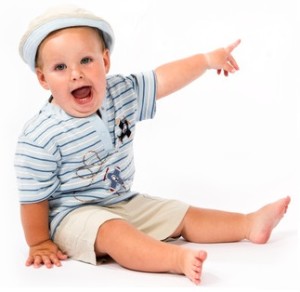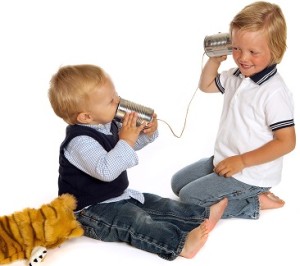What is typical language development?
A common question asked by parents is “What is typical speech and language development?” Plunket, preschools, kindergartens and school teachers can offer parents a rough guideline as to what should develop at what age, but what about the specifics? How many words should my child have in their vocabulary at age two? Is it normal for my three year old to not articulate the “L” sound?
It’s important to note that every child develops at their own pace and therefore some variation is to be expected. Some children are fast language learners and some are slow – this makes it hard to compare children. A better approach is to ensure that your child’s language development develops steadily and through the typical stages.
Developing communication skills
People often assume that communication starts to develop when baby utters their first words. This is not the case. A three-month old babe has already started to smile, turns to you when you speak, recognises Mum and Dads voices, responds to comforting tones, responds to ‘Motherese’ (the high pitched baby voice we all use when gazing at a gorgeous bub), coos and goos when content and their cries have started to differentiate to mean different things. This is all part of communication development.
Between four-months and six-months baby is really starting to vocalize and enjoys playing with sounds. Your baby starts to tune into all types of sounds (music, TV, telephone) not just speech. Any toys or games where sound is involved will typically be enjoyed. Your baby is starting to pick up on the different tones in your voice, they can recognise when you are calm, stressed, worried, angry and happy. Your baby will begin to use gestures to start communicating that they want something, reaching and pointing may develop around this age.
Between seven-months and twelve-months your baby’s ability to understand increases dramatically. They can now listen when they are spoken to, look when their name is called, recognise the names of familiar people and objects, respond to simple instructions (“Give me”) and respond to simple questions (“More water?”). Your baby starts to use more consonant sounds in their babbling and likes to use their voice to get help or attention.
First words
 For all parents hearing their child’s first words is a delight. Waiting in anticipation to hear whether it is going to be “Mama” or “Dada” or will they throw a curve ball and name their favourite pet or toy first? These precious first words can be expected between twelve-months and eighteen-months. During this time your child should develop an expressive vocabulary of between five – twenty words. Your child will learn new words every week.
For all parents hearing their child’s first words is a delight. Waiting in anticipation to hear whether it is going to be “Mama” or “Dada” or will they throw a curve ball and name their favourite pet or toy first? These precious first words can be expected between twelve-months and eighteen-months. During this time your child should develop an expressive vocabulary of between five – twenty words. Your child will learn new words every week.
Although your child may have started using their first words between the ages of one to two years your child’s understanding of language will still surpass their talking.
This age is exciting for developing your child’s receptive and expressive vocabulary. Your child is now able to point to pictures in books as you name them, point to their own body parts, they can listen to simple stories and enjoys songs and nursery rhymes.
Forming simple sentences
Between two and three years your child should now understand and follow two-step commands (“Give the milk to the baby”), understand contrasting concepts (hot vs. cold), expanded their vocabulary (150 – 300 words), start to make simple sentences (“What’s that?” “Go outside”), start to use prepositions words (“Baby on table” “Take out”), and they should have the ability to use plurals (“My flowers”).
Complex sentences
By three years of age children are learning to communicate quite effectively. Their understanding extends to ‘wh’ questions (what, who, where), time concepts (later, now, soon) and they should be able to understand more complicated instructions. As your child’s vocabulary develops (around 900 words) so does their ability to use longer more complex sentences. Your child now has the ability to use language to share experiences, tell stories and they can understand and respond quickly to questions relating to their immediate environment. Your child is starting to develop the use of pronouns and tense.
Conversation skills
By four years of age your child now hears and understands nearly everything that is said to them. They should be able to follow all instructions, even when the ob ject referred to is out of sight. They will enjoy story time and have the ability to answer simple questions relating to a story. Your child is starting to understand and use ‘if’ ‘but’ ‘when’ and ‘why’. Your child enjoys using language to make relationships and to explore. At this point your child is using mainly correct grammar in their sentences. They love make-believe and often talk extensively to themselves during play. It is lovely to see children starting to have proper conversations with other children.
ject referred to is out of sight. They will enjoy story time and have the ability to answer simple questions relating to a story. Your child is starting to understand and use ‘if’ ‘but’ ‘when’ and ‘why’. Your child enjoys using language to make relationships and to explore. At this point your child is using mainly correct grammar in their sentences. They love make-believe and often talk extensively to themselves during play. It is lovely to see children starting to have proper conversations with other children.
“When should I seek help for my child?”
Even though some parents may have concerns in regards to their child’s language development, they are reluctant to seek the advice of a speech and language therapist. This may be because the teachers at your child’s preschool, kindergarten or school may not be worried, or friends and family have offered reassurances that all is OK and other times it is because you may think that your child is too young to be assessed.
Babies, toddlers and preschoolers are not too young to be assessed, as speech and language therapists see children from infancy. Even if your child does not need therapy you may gain some helpful insights into how to extend your child’s language development. The right time to seek help is when you as a parent are concerned. If your child is a late talker or you are concerned about their language development, contact a speech and language therapist.
By Rosie Dwyer
Speech & Language Therapist
BA, MSLTPrac



